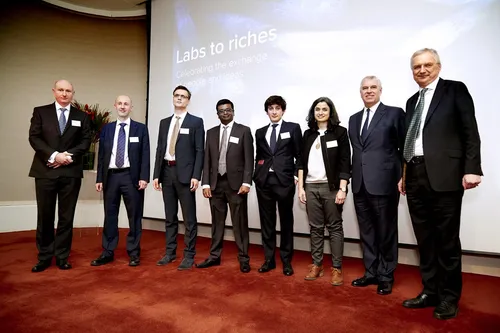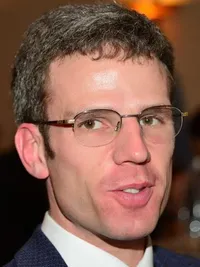Theory and Foundations News
Archive news content can be found here.
£14.7m industry partnership to boost engine research

Image ©Rolls Royce Plc
Scientists at the University of Warwick’s Department of Computer Science are to benefit from an initiative that seeks to build links between industry and researchers, as part of a project with Rolls-Royce to create a detailed simulation of a gas-turbine engine in operation.
The research aims to lead to the virtual certification of gas turbine engines, with the researchers also seeking to develop the next generation of engineering simulation and modelling techniques during their project.
Their challenge combines fundamental engineering and computational science research and will tackle a level of detail never before attempted in such a simulation.
The project, to be carried out over five years, involving the universities of Warwick, Bristol, Cambridge and Oxford and led by Edinburgh and is one of seven across the UK to benefit from a £42 million programme that aims to build links between the UK’s research base and industry partners.
This is one of two projects the University of Warwick has been granted money for by the Engineering and Physical Sciences Research Council (EPSRC) Prosperity Partnership, as WMG at the University of Warwick was also granted £7m for development of Rapid Alloy Prototyping. See: https://warwick.ac.uk/newsandevents/pressreleases/the_virtual_factory/
Commenting Professor Stephen Jarvis, Deputy Pro Vice-Chancellor for Research at the University of Warwick and the Warwick Principal Investigator on the Rolls-Royce Prosperity Partnership, said:
“The University of Warwick has been working with Rolls-Royce for the past ten years, investigating ways in which high performance computing can boost the productivity of aircraft engine design and engineering.
“We are delighted to be working with such a strong team of university and industry partners to deliver next generation engineering simulation and modelling capabilities."
Professor Philip Nelson, EPSRC’s Executive Chair said:
“Our first round of Prosperity Partnerships are proving a great success. They are bringing universities and industry together and applying the creative energies of both to engineering and scientific challenges.
“We are confident that these projects will deliver real benefits to all their partners and help the UK research, discover and innovate.”
The research project will begin in October 2018 and will be led by Professor Jarvis and Dr Mudalige from the Department of Computer Science.
Dr. Gihan Mudalige Awarded a Royal Society Industry Fellowship

Dr. Gihan Mudalige has been awarded a 4-year, Royal Society Industry Fellowship to work with Rolls Royce plc., on their turbomachinery design simulation applications from September 2018.
Companies such as Rolls-Royce, crucially depend on High Performance Computing (HPC) based numerical simulation applications for the design of turbomachinery. These complex multi-physics and engineering applications, predominantly based on computational fluid dynamics (CFD), even in their simplest form, provide insights into aspects of aircraft engines which could not otherwise be achieved in the absence of physical testing. Developing such simulation applications is difficult and expensive, taking years to write, test and verify. They can easily contain millions of lines of code. Consequently, such programs have lifetimes of decades compared to the supercomputers that run them, which advances every 2-4 years. In the next five years, HPC systems are expected to reach thousand times the capabilities of current systems, attaining exascale (1018) performance where a single system can perform million-trillion computations every second. The range of processor architectures, networks, memory, their configurations and scale make it difficult to know what type of systems will dominate exascale machines and how best to programme them to gain optimal performance. Poor performance means less simulation for your money or worse, a completely inoperable suite of codes. Such an outcome will mean a significant loss of investment. The underlying objective of this fellowship project is to re-design Rolls-Royce’s simulation codes to meet these challenges. This work will utilize the OP2, high-level embedded Domain Specific Language developed by Dr. Mudalige and his research collaborators at University of Oxford, PPCU Hungary and Imperial College London, aiming to re-engineer Rolls-Royce’s CFD applications suite and deploy it for production simulations.
Photo (© The Royal Society): The Royal Society Industry Fellows of 2018 (Round 1): from left to right Duncan Maclachlan, Steve Morgan, Del Atkinson, Gihan Mudalige, Anas Al Rawi, and Aurora Cruz-Cabeza, with HRH Prince Andrew, The Duke of York and Prof. Andrew Hopper, Labs to Riches presentation event, 20 March 2018, at the Royal Society head office in London.
Dr Laurent Doyen is a new Rutherford Visiting Fellow
 The Department will be welcoming Dr Laurent Doyen of CNRS and ENS Paris-Saclay as a Rutherford Visiting Fellow in 2018/19. This prestigious funding, whose aim is to attract top global talent into the UK, will allow Dr Doyen to collaborate closely with Dr Laure Daviaud, Dr Marcin Jurdzinski and Dr Ranko Lazic of DIMAP, as well as Dr Nathanael Fijalkow of the Alan Turing Institute, on cutting-edge research on fast algorithms for synthesis of safe, smart and adaptive controllers.
The Department will be welcoming Dr Laurent Doyen of CNRS and ENS Paris-Saclay as a Rutherford Visiting Fellow in 2018/19. This prestigious funding, whose aim is to attract top global talent into the UK, will allow Dr Doyen to collaborate closely with Dr Laure Daviaud, Dr Marcin Jurdzinski and Dr Ranko Lazic of DIMAP, as well as Dr Nathanael Fijalkow of the Alan Turing Institute, on cutting-edge research on fast algorithms for synthesis of safe, smart and adaptive controllers.
Professor Graham Cormode, the University of Warwick and Alan Turing Institute Liaison Director, commented:
Dr Doyen's Rutherford Visiting Fellowship will provide a major boost to building world-leading and long-lasting collaborative links among the Alan Turing Institute, the DIMAP multi-disciplinary research centre at Warwick, and LSV at ENS Paris-Saclay. The latter is an established European centre of excellence in logical aspects of computer and data sciences.
